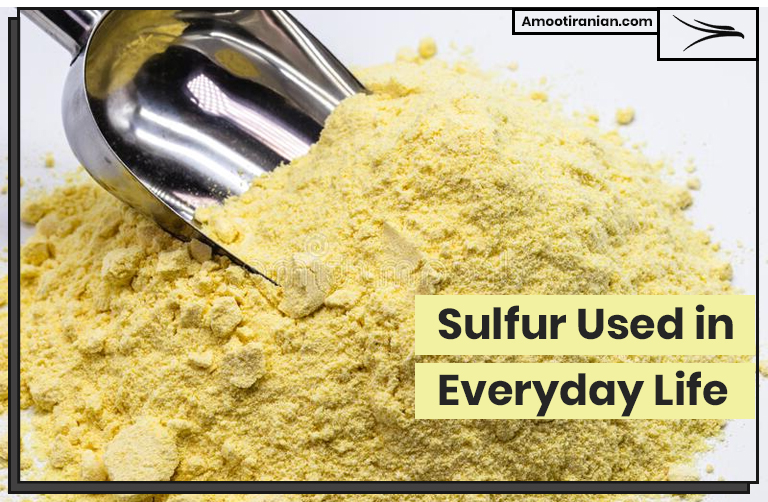This article explains the most important uses of sulfur in our daily lives, which made sulfur to be one of the most significant chemical elements of the world.
.
What Are Common Uses of Sulfur?
.

Sulfur is a chemical element with the symbol S and atomic number 16.
It is a nonmetal and belongs to the same group as oxygen in the periodic table.
.
Sulfur is abundant in nature and can be found in various forms, including:
- pure elemental sulfur
- sulfides
- sulfates
- organosulfur compound
.
The chemical properties of sulfur are characterized by its ability to form stable compounds with many other elements, such as:
- hydrogen
- oxygen
- nitrogen
- carbon
Sulfur reacts readily with oxygen to form sulfur dioxide and sulfur trioxide, which are used in the production of sulfuric acid, one of the most widely used industrial chemicals in the world.
.

.
Overall, sulfur is an important chemical element with a wide range of applications in various industries, from agriculture to pharmaceuticals and manufacturing. Its unique chemical properties and versatility make it a valuable resource for many different purposes.
.
What Are Everyday Uses of Sulfur?
.
| Industry/Application | Use of Sulfur |
| Agriculture | Used in fertilizers to enhance plant growth and improve soil fertility |
| Pharmaceuticals | Used in the production of antibiotics, anti-inflammatory drugs, and skin treatments |
| Personal care | Used in the production of soaps, shampoos, and other personal care products |
| Food industry | Used as a food preservative (sulfur dioxide) to prevent spoilage |
| Rubber industry | Used as a vulcanizing agent to improve the strength and elasticity of rubber |
| Petroleum industry | Used in the refining process to remove impurities from crude oil |
| Mining industry | Used in the extraction of certain metals, such as copper and zinc |
| Batteries | Used in lead-acid batteries to enhance their performance |
| Construction | Used in the production of concrete to improve its strength and durability |
| Textile industry | Used in the production of textiles to enhance dyeing and printing processes |
| Pesticides | Used as an ingredient in some pesticides to control insects and mites |
| Water treatment | Used to remove chlorine and other chemicals from drinking water |
| Paper industry | Used as a bleaching agent in the production of paper |
| Matches | Used in the striking surface of some matches to ignite the flame |
| Photography | Used as a toning agent in black and white photography |
| Fireworks | Used as a component in some fireworks to produce colors |
| Chemical industry | Used in the production of sulfuric acid, which is widely used in various chemical processes |
.
Should Sulfur First Converted to Sulfuric Acid and Then be Used?
Not necessarily! While sulfuric acid is a valuable and widely used industrial chemical, it is not always necessary to convert sulfur into sulfuric acid before using it.
.
Sulfur can be used directly in some applications, such as in the production of fertilizers or as a fungicide in agriculture.
In other applications, sulfur may be reacted with other chemicals to form specific compounds or products, such as in the production of sulfur dioxide for use as a food preservative or in the production of sulfur trioxide for use in the production of sulfuric acid.
.

.
However, sulfuric acid is a highly useful and versatile chemical that is widely used in various industries and applications, such as in the production of fertilizers, detergents, and other industrial chemicals.
Sulfur can be converted into sulfuric acid using the contact process, which involves oxidizing sulfur dioxide to sulfur trioxide and then reacting the sulfur trioxide with water to produce sulfuric acid.
.
Overall, whether or not sulfur should be first converted to sulfuric acid before use depends on the specific application and the desired end product.
.
Which Industry Uses the Most Amount of Sulfur?
The industry that uses the most amount of sulfur is the fertilizer industry.
.
Sulfur is a key ingredient in the production of sulfuric acid, which is used to manufacture phosphate fertilizers. These fertilizers are widely used in agriculture to enhance plant growth and improve soil fertility.
According to the International Fertilizer Association, approximately 70% of the world’s sulfur consumption is used in the production of fertilizers.
Other industries that use significant amounts of sulfur include the petroleum refining industry, the chemical industry, and the metal processing industry.
In the petroleum refining industry, sulfur is used to remove impurities from crude oil during the refining process.
In the chemical industry, sulfur is used as a raw material in the production of various chemicals, such as detergents and pigments. In the metal processing industry, sulfuric acid is used to extract certain metals, such as copper and zinc, from ores.
.
Overall, the fertilizer industry is the largest consumer of sulfur due to the high demand for phosphate fertilizers in agriculture.
